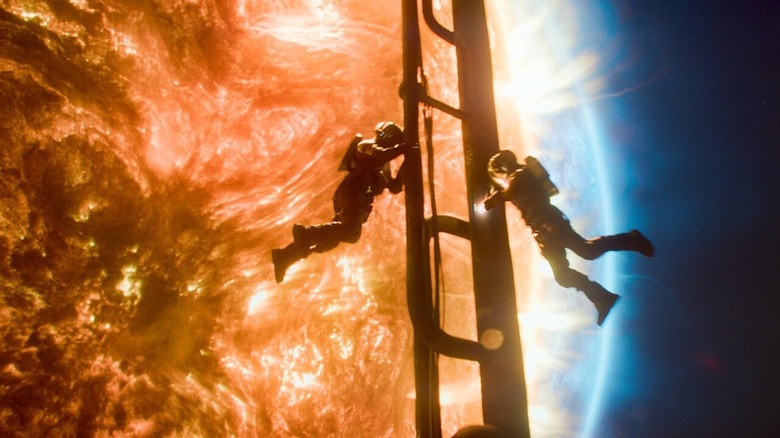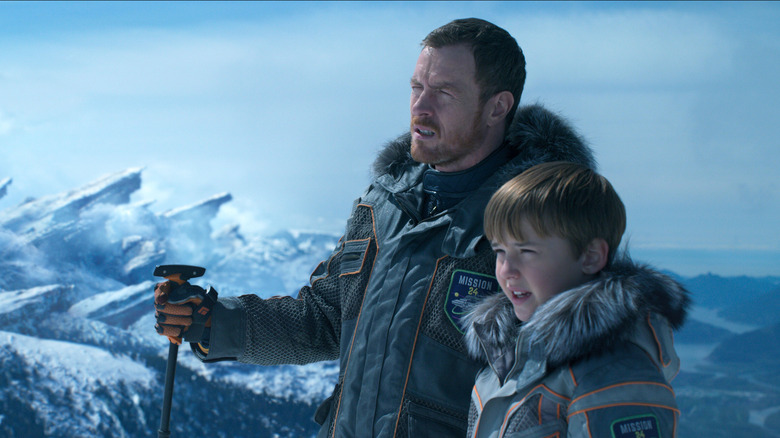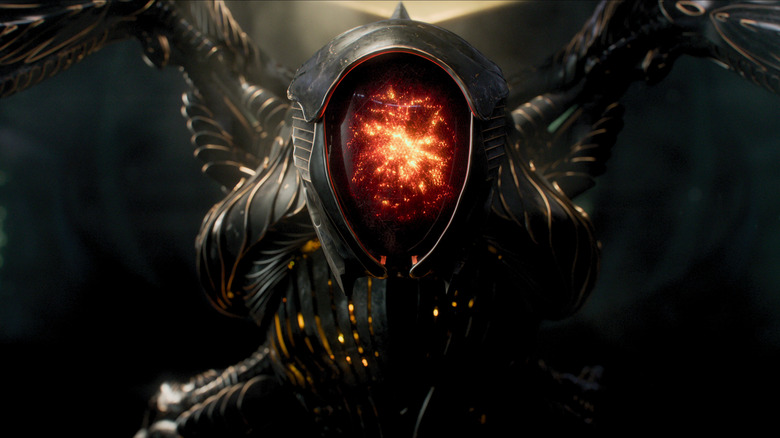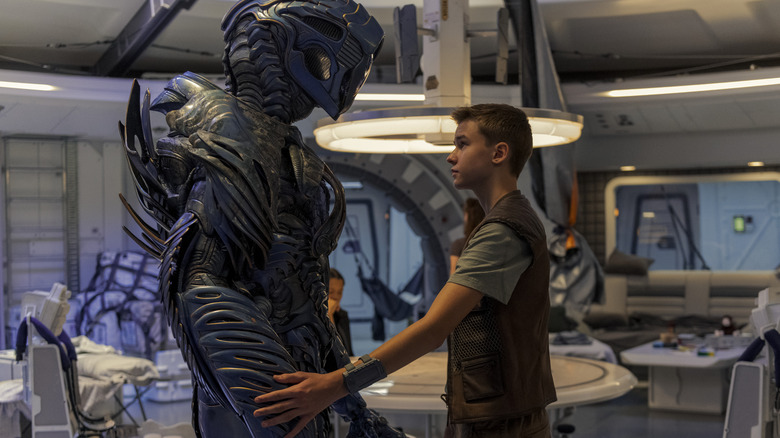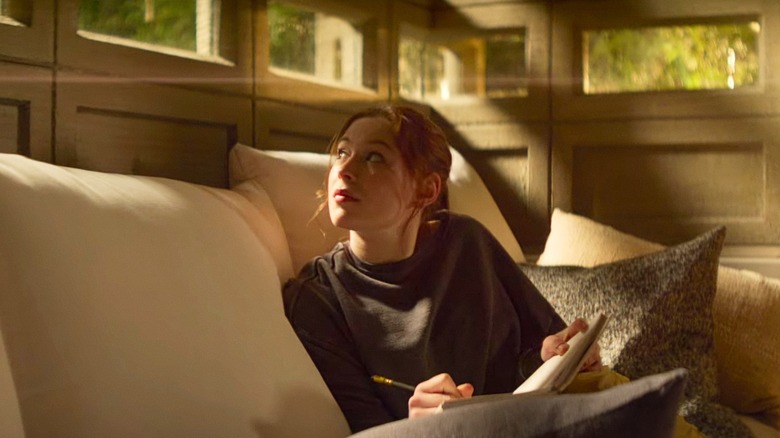Lost In Space Season 3 Ending Explained: Trust, Will Robinson
"Lost in Space" (or, to use the title I personally gave it, "A Series of Unfortunate Events ... in Space!") has come to an end after three seasons packed with stunning sci-fi visuals and, despite the darkness along the way, a fundamentally hopeful vision of humanity's future. Based on the 1960s CBS show of the same name, "Lost in Space" debuted on Netflix in 2018 and has traveled many lightyears since then.
When "Lost in Space" season 3 begins, the Robinson children have been separated from their parents for almost a year (providing a handy explanation for why Will Robinson actor Maxwell Jenkins is now about three feet taller). Given a choice between heading on to Alpha Centauri and going back to rescue their parents from near-certain death, Captain Judy Robinson makes the decision to defy her original instructions and return to where the rest of the colonists were stranded, risking the children's lives but ultimately getting everyone to Alpha Centauri alive.
Unfortunately, danger isn't far behind them. After acquiring the location of Alpha Centauri by scanning Don West (the only member of the Jupiter-2 crew who has been to the colony before), alien robot leader SAR prepares to launch an attack on the colony, sending an advance team to sabotage its power supply. Alpha Centauri manages to raise its defense shields again (unlike most sci-fi shows, the human spaceships in "Lost in Space" are not equipped with guns or missiles, so defending is the best they can do), but not before a single alien robot ship gets through — with SAR onboard.
Previously, On Lost in Space...
For many shows, but especially one with a three-season arc as tight and cohesive as that of "Lost in Space," it's impossible to fully appreciate the ending without a reminder of how things started. The series finale may find the expanded Robinson family sitting around the dinner table in an atmosphere of warmth and affection, but that same family started out cold. And I'm not just talking about the ice-frosted planet that the Robinsons landed on in the "Lost in Space" pilot episode, "Impact."
When we first met the Robinsons, Maureen and John were barely on speaking terms and the kids didn't get along great either. In "Impact," Penny cheats at cards and, after being caught, stubbornly insists that Will hand over his card anyway. Penny and Judy also snipe at each other, setting a precedent for the bristly dynamic between the two sisters that would persist throughout the series. Once we learn that this is a family of exceptional over-achievers who passed the stringent tests required for the colony mission (all except Will, who failed the stress test but had his results fudged by Maureen), the in-fighting and tension between the Robinsons starts to make a lot of sense.
The opening episode also sheds light on why, in "Lost in Space" season 3, Will Robinson feels the need to silently shoulder so much of the responsibility for keeping the colony and his family safe — even if it means sacrificing his own life. When the Jupiter sinks into icy waters in "Impact," John wastes no time in telling his young son that he'll have to be the one to dive down and retrieve power cells from the ship. After Will freezes up in fear, Judy dives into the water and, because she couldn't fit into the same tight gaps that Will could have, runs out of time and almost dies. For Will, it was an early and brutal lesson that if he doesn't answer the call to wade into danger, his hesitation could cost his family their lives.
In "Impact," we also see for the first time the "reprogramming" that turns the tide of the fight against the alien robots in the "Lost in Space" series finale. Though Will and the split-in-half Robot are caught up in the same raging fire, Will doesn't choose to save the alien in the hopes that it will return the favor. Instead, he simply says that there's no need for both of them to die, and after he frees Robot he leans back against the tree to accept his fate. It's an act of pure altruism, done with no expectation of reward, that radically disrupts Robot's programming.
The finale offers a callback to "Dr. Smith's" very first appearance in the show: once again, she is found in a position of power over someone helpless, whose death would be advantageous to her. But whereas in "Impact" she stole the real Dr. Smith's jacket and left him for dead, in "Trust" she is prevented from committing an unforgivable act of murder by Robot, who arrives just in time to "help Dr. Smith."
The pilot episode even lays the groundwork for the end of Don West's arc. In a flashback, Don is shown searching for an escape route during the initial attack on the Resolute. His friend Tam points out that the Jupiters are only meant for the colonist families, not for lowly mechanics like themselves. Three seasons later, it's safe to say that Don has firmly found his family.
Why SAR Hates Will Robinson So Much
"Lost in Space" season 3 finally answered the question of why the Second Alien Robot (dubbed "SAR") was so single-mindedly intent on finding Will Robinson. The secret lies in the origin story of the alien robots, and strongly ties into the show's themes of trust, friendship, and family.
As Will learned while exploring the ruins of an alien city on the planet where the Fortuna was stranded, the alien robots were created by an organic race and designed in their image — with four arms, two legs, and sharp claws. This race was wiped out by a violent, cataclysmic event, which SAR cryptically claims responsibility for. In "Trust," Will realized with horror exactly what killed the alien robots' parent race: an engine activating on the surface of the planet, ripping a hole in space hard enough to split their world apart.
Why did SAR kill its creators? Because the robots' programming forces them to respond to commands spoken in the alien language, and SAR believed that the only way it could ever gain free will was by destroying every last member of its parent race. Freedom, above all else, is what SAR craves. So, when SAR came across an alien robot who had seemingly been reprogrammed by a member of the squishy human race — the same race that had enslaved Scarecrow and used stolen alien technology for its colony missions — it was terrified of being forced to obey a master again. SAR's dogged pursuit of Will has been driven by its determination to find out how Will managed to "reprogram" Robot, and then make sure no one could ever do it again.
Of course, SAR actually has it the wrong way round. Robot wasn't reprogrammed by Will, but liberated from his original programming and given the free will that SAR so desperately wants. SAR, meanwhile, is still a slave to its programming; killing its masters didn't change that, it simply silenced them from giving orders. When the Robinsons and their allies surround SAR, playing a recording of commands in the alien language, the robot finds itself once again brought to its knees. The audio of the commands was a gift given to Will and Dr. Smith by the alien robots back on their home planet: after witnessing Robot sacrificing himself to save Will, the aliens decided to trust the humans with the key to defeating SAR.
The key ingredient that allows Robot, Sally, and the other alien robots to actually break free from their programming? "Trust, Will Robinson." When Will and Penny repaired their respective robot friends, it was done as an act of trust. In turn, the robots trusted them and bonded with their new human companions in a manner that was liberating.
At the risk of oversimplifying the themes of "Lost in Space," this one is pretty clear: Violence and revenge ultimately become a prison, but forgiveness and trust will set you free.
Let's Talk About the Death Fake-Outs
"Lost in Space" has a habit of pushing its characters perilously close to the edge of death, and it really stepped that up in the final few episodes of season 3. Will gets at least two death fake-outs, while Robot gets one of his own. And they're all tied into Will's heart, which SAR concludes must be the key to his "hacking" powers. First SAR stabs Will in the heart, and he gets a dramatic farewell scene complete with voiceover of his final goodbyes to his family. Then Will gets an artificial heart on Alpha Centauri, but puts it through too much strain in traveling to the alien robots' planet in search of help. He accepts his imminent death; after Dr. Smith suggests that he lie down and rest, Will tells her that it won't make a difference any more.
That's Robot's cue for his own death fake-out, and this one is a lot more convincing than Will's. Using some kind of alien robot lightning medicine ... thing, Robot instantly heals Will back to peak health, at the cost of Robot himself being reduced to ash. It's a moment that's painfully reminiscent of "The Iron Giant," but "Lost in Space" has a considerably happier ending.
In an ironic twist, Will's heart does turn out to be everything SAR feared it was: a hacking device. During the lightning storm, Robot transferred his consciousness into Will's new, artificial heart. When Will is stabbed through the heart by SAR a second time, Robot seizes hold of that connection and used it to completely overtake SAR's body. The malevolent alien robot is defeated, and Robot has a brand new body.
How Does Penny's Book End?
It's a happy ending for the Robinson family, which now includes not only Robot, but also Don West, Debbie the Chicken, and Judy's biological father, Grant Kelly. While things end on cordial terms with Dr. Smith, there's quite a bit of healing left to do before she becomes "family" — if that's something she even wants.
Speaking of healing, the newly-liberated alien robots have made a tentative alliance with the humans of Alpha Centauri, with the two races combining their technology to build a new ship that combines the best of the Resolute and the alien spaceships. This new union is symbolized by Will and Robot going off to get "lost in space" all over again, exploring new planets and gathering new information about the universe. After everything the family has gone through and survived, Will's siblings and parents no longer worry about him being out in dangerous waters (or at least, not too much) because he's proven many times over that he can take care of himself. Also, he has a seven foot robot friend to protect him.
Perhaps the most intriguing part of the "Lost in Space" epilogue is the fact that many robots — including Sally, the one that Penny rescued and bonded with — simply choose to leave when the battle's over, giving no indication of where they're going. It's an important reminder that the robots don't owe anything to the humans, not even those who personally saved them. After Scarecrow's enslavement and the dirty secret that Alpha Centauri and the other colonies were built on, humans definitely owed the robots an olive branch.
Though it may never have reached the heights of hype that other Netflix genre shows, like "Stranger Things" or "The Witcher" achieved, "Lost in Space" has quietly earned its place as one of the best sci-fi TV shows of the 21st century. As one of the show's stars, Mina Sundwall, stated, the show harbors themes of inclusivity and understanding. And now that the story has come to a satisfying conclusion, hopefully more fans of all things outer space will discover this gem of curiosity- and hope-driven futuristic fiction.
